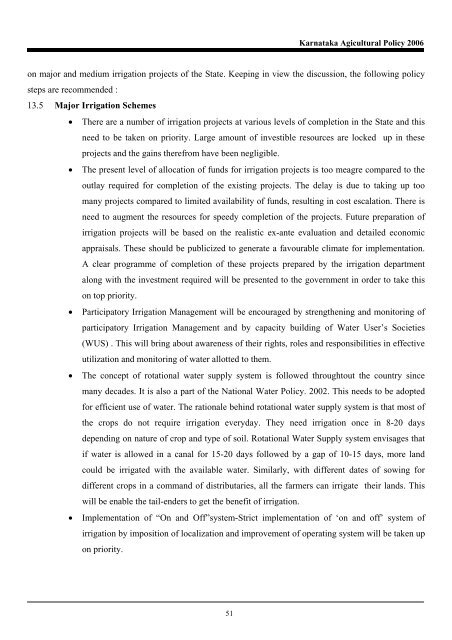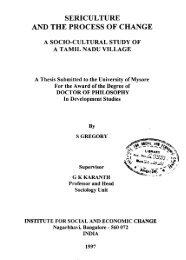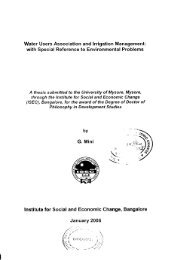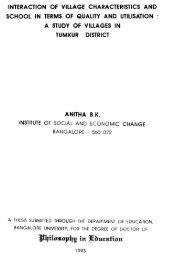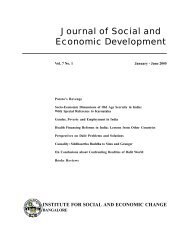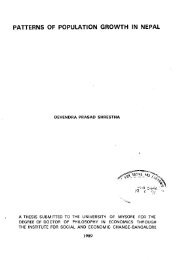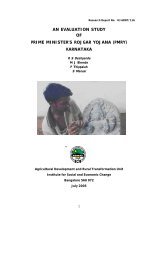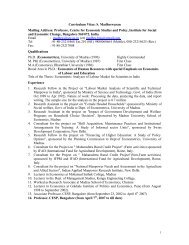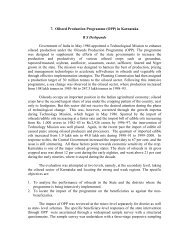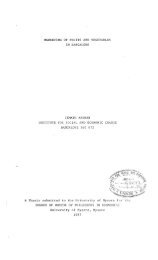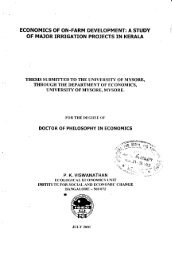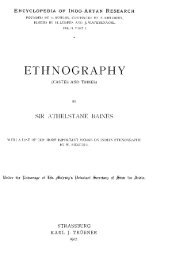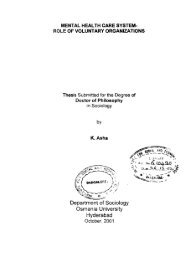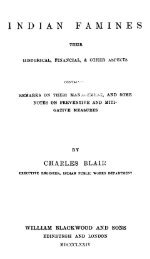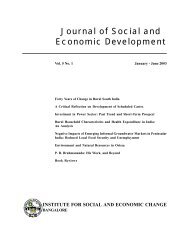Karnataka Agricultural Policy - Institute for Social and Economic ...
Karnataka Agricultural Policy - Institute for Social and Economic ...
Karnataka Agricultural Policy - Institute for Social and Economic ...
Create successful ePaper yourself
Turn your PDF publications into a flip-book with our unique Google optimized e-Paper software.
<strong>Karnataka</strong> Agicultural <strong>Policy</strong> 2006<br />
on major <strong>and</strong> medium irrigation projects of the State. Keeping in view the discussion, the following policy<br />
steps are recommended :<br />
13.5 Major Irrigation Schemes<br />
• There are a number of irrigation projects at various levels of completion in the State <strong>and</strong> this<br />
need to be taken on priority. Large amount of investible resources are locked up in these<br />
projects <strong>and</strong> the gains therefrom have been negligible.<br />
• The present level of allocation of funds <strong>for</strong> irrigation projects is too meagre compared to the<br />
outlay required <strong>for</strong> completion of the existing projects. The delay is due to taking up too<br />
many projects compared to limited availability of funds, resulting in cost escalation. There is<br />
need to augment the resources <strong>for</strong> speedy completion of the projects. Future preparation of<br />
irrigation projects will be based on the realistic ex-ante evaluation <strong>and</strong> detailed economic<br />
appraisals. These should be publicized to generate a favourable climate <strong>for</strong> implementation.<br />
A clear programme of completion of these projects prepared by the irrigation department<br />
along with the investment required will be presented to the government in order to take this<br />
on top priority.<br />
• Participatory Irrigation Management will be encouraged by strengthening <strong>and</strong> monitoring of<br />
participatory Irrigation Management <strong>and</strong> by capacity building of Water User’s Societies<br />
(WUS) . This will bring about awareness of their rights, roles <strong>and</strong> responsibilities in effective<br />
utilization <strong>and</strong> monitoring of water allotted to them.<br />
• The concept of rotational water supply system is followed throughtout the country since<br />
many decades. It is also a part of the National Water <strong>Policy</strong>. 2002. This needs to be adopted<br />
<strong>for</strong> efficient use of water. The rationale behind rotational water supply system is that most of<br />
the crops do not require irrigation everyday. They need irrigation once in 8-20 days<br />
depending on nature of crop <strong>and</strong> type of soil. Rotational Water Supply system envisages that<br />
if water is allowed in a canal <strong>for</strong> 15-20 days followed by a gap of 10-15 days, more l<strong>and</strong><br />
could be irrigated with the available water. Similarly, with different dates of sowing <strong>for</strong><br />
different crops in a comm<strong>and</strong> of distributaries, all the farmers can irrigate their l<strong>and</strong>s. This<br />
will be enable the tail-enders to get the benefit of irrigation.<br />
• Implementation of “On <strong>and</strong> Off”system-Strict implementation of ‘on <strong>and</strong> off’ system of<br />
irrigation by imposition of localization <strong>and</strong> improvement of operating system will be taken up<br />
on priority.<br />
51


